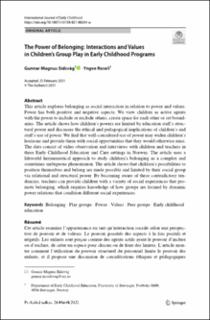| dc.contributor.author | Eidsvåg, Gunnar Magnus | |
| dc.contributor.author | Rosell, Lars Yngve | |
| dc.date.accessioned | 2023-02-16T08:40:06Z | |
| dc.date.available | 2023-02-16T08:40:06Z | |
| dc.date.created | 2021-03-26T13:35:00Z | |
| dc.date.issued | 2021 | |
| dc.identifier.citation | Eidsvåg, G. M., & Rosell, Y. (2021). The power of belonging: Interactions and values in children’s group play in early childhood programs. International Journal of Early Childhood, 53, 83-99. | en_US |
| dc.identifier.issn | 0020-7187 | |
| dc.identifier.uri | https://hdl.handle.net/11250/3051325 | |
| dc.description.abstract | This article explores belonging as social interaction in relation to power and values. Power has both positive and negative aspects. We view children as active agents with the power to include or exclude others, create space for each other or set boundaries. The article shows how children’s powers are limited by education staff’s structural power and discusses the ethical and pedagogical implications of children’s and staff’s use of power. We find that well-considered use of power may widen children’s horizons and provide them with social opportunities that they would otherwise miss. The data consist of video observation and interviews with children and teachers in three Early Childhood Education and Care settings in Norway. The article uses a lifeworld hermeneutical approach to study children’s belonging as a complex and sometimes ambiguous phenomenon. The article shows that children’s possibilities to position themselves and belong are made possible and limited by their social group via relational and structural power. By becoming aware of these contradictory tendencies, teachers can provide children with a variety of social experiences that promote belonging, which requires knowledge of how groups are formed by dynamic power relations that condition different social experiences. | en_US |
| dc.language.iso | eng | en_US |
| dc.publisher | Springer | en_US |
| dc.rights | Navngivelse 4.0 Internasjonal | * |
| dc.rights.uri | http://creativecommons.org/licenses/by/4.0/deed.no | * |
| dc.title | The Power of Belonging: Interactions and Values in Children's Group Play in Early Childhood Programs | en_US |
| dc.type | Peer reviewed | en_US |
| dc.type | Journal article | en_US |
| dc.description.version | publishedVersion | en_US |
| dc.rights.holder | The authors | en_US |
| dc.subject.nsi | VDP::Samfunnsvitenskap: 200::Pedagogiske fag: 280 | en_US |
| dc.source.journal | International Journal of Early Childhood | en_US |
| dc.identifier.doi | 10.1007/s13158-021-00284-w | |
| dc.identifier.cristin | 1901321 | |
| cristin.ispublished | true | |
| cristin.fulltext | original | |
| cristin.qualitycode | 1 | |

